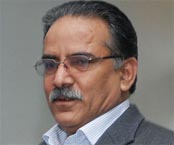Nepalese prime minister faces contempt of court charge
 Kathmandu - Nepalese Prime Minister Pushpa Kamal Dahal along with several top Maoist leaders face contempt of court charges over their reaction to a recent court ruling, media reports said Thursday.
Kathmandu - Nepalese Prime Minister Pushpa Kamal Dahal along with several top Maoist leaders face contempt of court charges over their reaction to a recent court ruling, media reports said Thursday.
A writ was filed at the Nepalese Supreme Court Wednesday against Dahal, Finance Minister Babu Ram Bhattarai and four other top Maoist leaders for their public criticism of the court, the Kathmandu Post newspaper said.
The charges centre on their public outbursts as well as Maoist demonstrations across the country after the court overturned a government decision to retire eight army generals by ignoring the army headquarters' recommendation to extend their term by another three years.
"The leaders of the ruling party have breached the laws of the land by disgracing the Supreme Court and its order to reverse the decision to send the generals into retirement," the newspaper quoted the writ against the Maoist politicians as saying.
"Dahal is the key figure in the contempt of court because he is the leader of the Communist Party of Nepal (Maoists), which had attacked the Supreme Court," the writ argued.
It remains unclear what action, if any, would be taken against the prime minister and other Maoist leaders if they are found guilty of contempt of court.
The Maoist-organized demonstrations in several parts of Nepal followed the court decision to reinstate the generals last month. The Maoist cadres also burned effigies of Supreme Court judges.
The Maoist leaders addressing the gatherings threatened to storm the courts with thousands of protestors.
The eight brigadier generals have since resumed their posts.
The row over the retirement of the generals has been seen as a sign of worsening relations between the army and the Maoists, who were archenemies during Nepal's decadelong communist insurgency.
There were also fears that the row between the Maoist-led government and the army could jeopardize integration of thousands of former rebel fighters into security agencies as part of a peace deal that ended the insurgency in 2006.
The Maoists formed a coalition government in August 2008 after emerging as the single largest party in elections. (dpa)